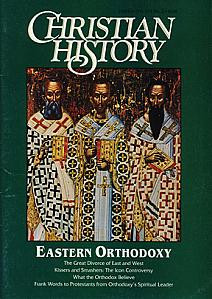Maximus the Confessor Faced Down Heretics
MAXIMUS GOT THE NAME “confessor” because he confessed the truth about Christ at the cost of his comfort. Born somewhere in the Middle East around 580, he was well-educated and became the secretary of Emperor Heraclius. In 626, he abruptly left the service of the emperor for reasons unknown and joined the monastery at Philippicus across the straits from Constantinople. There he quickly rose to the position of abbot.
At that time, as Christians tried to understand Christ’s two natures, a view called monothelitism was gaining ground. This was the belief that Christ’s divine will had swallowed up his human will. Maximus opposed this as heretical, pointing out that if Christ was not fully human, he could not obtain our salvation. With Islam rising and foes pounding the Eastern empire on every side, Emperor Constans II feared religious disunity. He tried to compel everyone to accept compromises set forth in books called the Ecthesis and the Typos. Although many eastern bishops signed on, Maximus rejected both.
In 655, when Maximus was about seventy-five years old, the emperor exiled him to Thrace. He charged him with having caused the loss of the empire’s North African territories to the Muslims! In exile, Maximus suffered hunger and cold. Next year, the emperor sent Theodosius of Caesarea to try to change the abbot’s mind. They encountered each other on this day, 24 September 656. Theodosius charged Maximus with pride: “You think that you are the only Orthodox theologian, the only person being saved, and that everyone else is a heretic and perishing!”
Maximus vindicated his position from Scripture, adding, “God forbid that I should condemn anyone, or say that I alone am being saved. However, I would sooner agree to die than, having fallen away in any way from the right faith, endure the torments of my conscience.” He would not give way.
Three times the emperor shifted Maximus’s place of imprisonment, causing the old man great suffering. According to one account, Maximus, now in his eighties, was brought back to Constantinople for a final trial in 662, where he was condemned. Church and state cut out his tongue, lopped off his right hand, and sent him to prison in a northern province of the eastern empire, where he died a few months later.
A prolific writer, Maximus produced over forty books. Both the eastern and western churches consider him a saint. His views of Christ were vindicated by the Sixth Ecumenical (universal) Council, which ruled that Christ indeed had two wills, the human and the divine.
—Dan Graves
----- ----- -----
For more on Maximus, see "Eastern Orthodoxy: A Gallery of Impact Pray-ers" in Christian History #54, Eastern Orthodoxy: Then and Now






